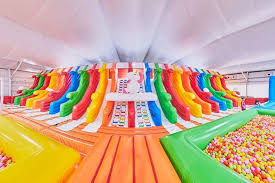The Power of Play: Enhancing Cognitive Skills
Indoor playgrounds offer a controlled yet stimulating environment for children to explore, learn, and develop essential cognitive skills. According to research published in the Early Childhood Education Journal, children who engage in free play in such settings often show a 34% improvement in spatial awareness and problem-solving skills. This is because navigating through mazes, climbing structures, and playing interactive games requires children to use reasoning and understand spatial relationships. These playgrounds are designed to challenge a child's thinking and coordination in a safe environment, which is crucial during the formative years of cognitive development.
Emotional and Social Development Through Interaction
Social interactions in indoor playgrounds play a vital role in the emotional and social development of children. A study by the Child Development Institute highlights that children who regularly play in such environments are more adept at expressing themselves and managing emotions. This stems from the opportunity to interact with peers in a variety of scenarios, from collaborative play to resolving conflicts over toys or turns in games. These interactions help children develop empathy, patience, and communication skills.
Physical Health and Motor Skills Advancement
Indoor playgrounds are more than just fun. They are a hotspot for promoting physical health and the enhancement of fine and gross motor skills. Activities like climbing, jumping, and crawling are integral to these playground environments, aiding in muscle development, balance, and coordination. The American Journal of Pediatrics found that children engaging in physical play for at least 60 minutes daily are 40% more likely to have better motor skills than their less active peers. This kind of physical activity is especially important in today’s digital age, where sedentary lifestyles are becoming more common among children.
Creativity and Imagination
One of the less quantified yet equally significant benefits of indoor playgrounds is the stimulation of creativity and imagination. When children encounter play structures that mimic castles, spaceships, or jungle gyms, they are transported into worlds of their own creation. This imaginative play is critical as it allows children to build narratives and scenarios, fostering a type of creative thinking that transcends traditional learning boundaries. These skills are not only fundamental in artistic pursuits but are increasingly valued in problem-solving contexts in the real world.
Safe Play, No Matter the Weather
A distinct advantage of indoor playgrounds is their ability to provide a safe and controlled play environment regardless of outdoor weather conditions. This consistent availability ensures that children can maintain regular physical activity and social interactions, which are crucial for their overall development. Parents can rest easy knowing their children are in a safe space, free from the hazards of outdoor play such as weather, pollution, or unsecured equipment.
Indoor Playground setups not only bolster physical health but also foster a myriad of developmental skills ranging from cognitive growth to creative expression. They provide a versatile and enriching environment for children, facilitating essential developmental milestones through the power of play. By integrating these structures into routine playtime, parents and educators can significantly enhance the developmental trajectory of their children, preparing them for the diverse challenges of the future.
